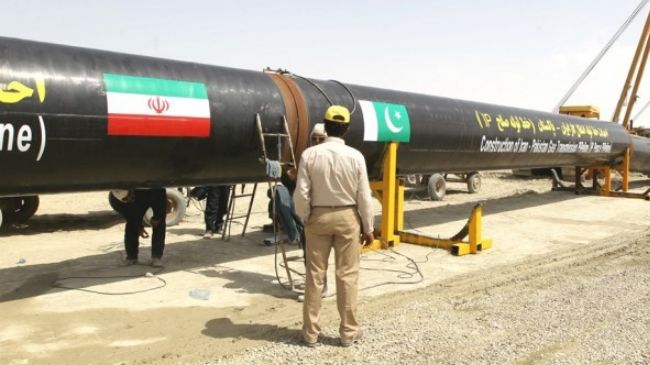Pakistan plans to import Iranian gas by early 2015

By Sara Rajabova
Pakistan is committed to finish the pipeline projected to carry natural gas from Iran to the country and will start importing gas from its western neighbor by early 2015, Press TV reported.
Pakistani Minister for Petroleum and Natural Resources Shahid Khaqan Abbasi told the National Assembly that the Iran-Pakistan gas pipeline would finally be completed in December.
The IP gas pipeline is projected to come on stream in 2014. The pipeline, projected to cost $1.2-1.5 billion, will enable the export of 21.5 million cubic meters per day of Iranian natural gas to Pakistan.
Iran has already constructed more than 900 kilometers of the pipeline on its soil.
Abbasi also noted that Islamabad is bound to purchase gas from Iran by January 1, 2015 and it would face a penalty of $3 million per day if it fails to meet the deadline.
He said that despite a number of obstacles, the government remains committed to completing the gas pipeline project within the stipulated timeframe.
The final construction phase of the pipeline was inaugurated on March 11.
The 2,700-kilometer-long pipeline will begin from Iran's Assalouyeh Energy Zone in the south and stretch over 1,100 kilometers through Iran. The joint multi-billion-dollar pipeline is designed to help Pakistan meet its growing energy needs at a time when the country of over 180 million people is grappling with serious energy shortages.
Pakistani Federal Minister for Planning Ahsan Iqbal said in early June that the new Pakistani government will continue the joint gas pipeline project with Iran, saying the energy issue is Islamabad's top priority.
Besides, Pakistan plans to expand the cooperation with Iran in other areas.
Pakistani Minister of Water and Power Khawaja Muhammad Asif said Islamabad is in talks with Iran on increasing the imports of electricity from that country to overcome a severe energy crisis.
Pakistan is reportedly battling a chronic electricity shortage, which is inflaming public anger and stifling industrial output, as power outages can last eight to 10 hours a day in cities, with much more frequent cuts in rural areas.
Asif noted that the Pakistani government is considering the import of 1,174 megawatts (MW) of electricity from Iran.
The Pakistani minister went on to say that the feasibility study of the project, submitted by a consortium of consultants, was endorsed by Iran Power Generation and Transmission Company (TAVANIR) and Pakistan's National Transmission and Dispatch Company (NTDC) on May 31.
Asif said that the case has been forwarded to the Pakistani Ministry of Water and Power for the approval of the Economic Coordination Committee before being submitted to the National Electric Power Regulatory Authority (NEPRA), which is responsible for regulating electricity in Pakistan.
Pakistan is currently importing 74 MW of electricity from Iran for the bordering areas of Balochistan. Electricity imports from Iran reportedly cost Pakistan around $3 million a month.
Pakistan's electricity is generated, transmitted, distributed and sold by two public sector utilities -- Water and Power Development Authority, responsible for all of Pakistan except Karachi and Karachi Electric Supply Corp -- along with roughly 20 independent power producers. None have developed substantive solutions to the country's ongoing power crisis.
Here we are to serve you with news right now. It does not cost much, but worth your attention.
Choose to support open, independent, quality journalism and subscribe on a monthly basis.
By subscribing to our online newspaper, you can have full digital access to all news, analysis, and much more.
You can also follow AzerNEWS on Twitter @AzerNewsAz or Facebook @AzerNewsNewspaper
Thank you!
